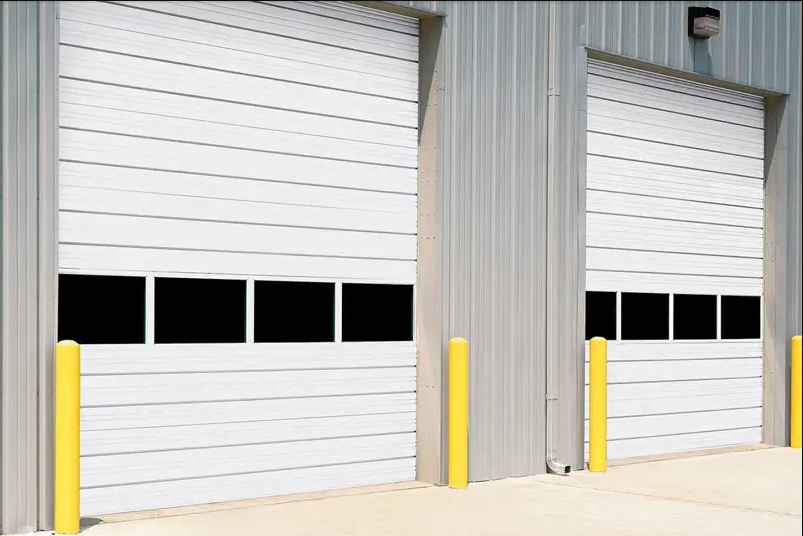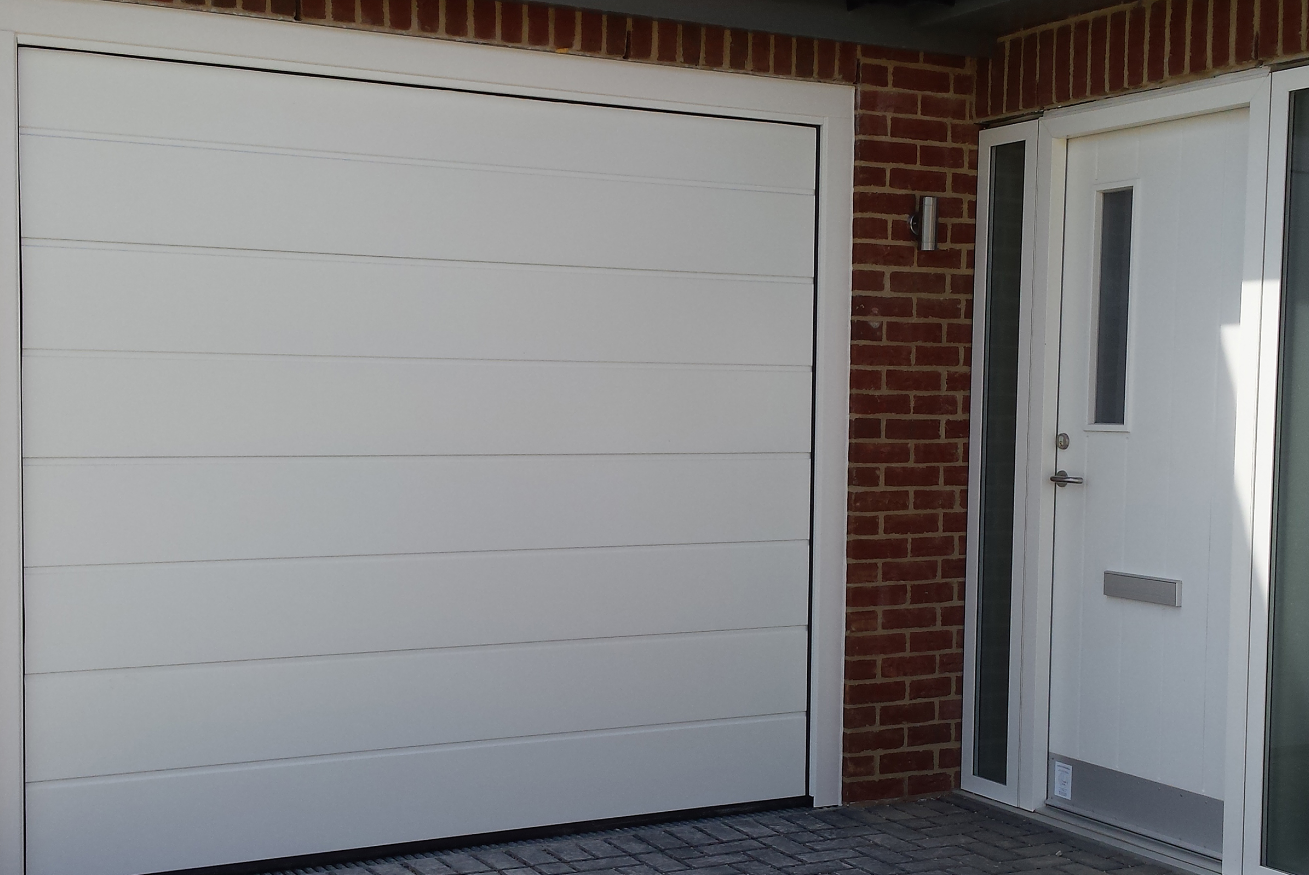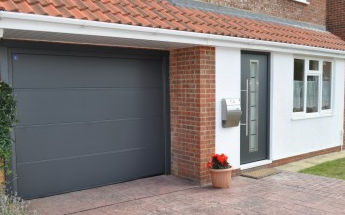The thickness of a sectional garage door can vary widely, ranging from as thin as 0.05 inches for aluminum doors to up to 3 inches for wooden doors.
Types of Sectional Garage Doors
When it comes to sectional garage doors, one of the most important factors to consider is the type of construction. The construction type directly influences the door’s thickness, insulation capabilities, and durability. Here, we will delve into three major types of sectional garage doors: Single Layer Doors, Double Layer Doors, and Triple Layer Doors.

Single Layer Doors
Also known as “pan garage doors,” these are the most basic and affordable type. These doors consist of a single layer of material, usually steel or aluminum. Because of their single-layer construction, these doors are relatively thin, ranging from 1/16″ to 1/8″ in thickness.
Pros:
- Affordable
- Lighter weight
- Easier to install
Cons:
- Poor insulation
- Less durable
- Prone to dents and damage
Ideal For:
- Budget-conscious consumers
- Less frequent use
- Warmer climates where insulation is less of a concern
For more detailed information on materials, you can visit the Steel and Aluminum Wikipedia pages.
Double Layer Doors
A step up from single-layer doors, double-layer sectional garage doors feature an additional layer of insulation sandwiched between the interior and exterior layers. This insulation layer usually consists of polystyrene or polyurethane and can significantly improve the door’s thermal performance.
Pros:
- Moderate insulation
- Improved durability
- Mid-range cost
Cons:
- Heavier than single-layer doors
- More complex installation
- Moderate cost
Ideal For:
- Moderate climates
- Regular use
- Consumers looking for a balance between cost and performance
For more on insulation types, you can check out the Polystyrene and Polyurethane Wikipedia pages.
Triple Layer Doors
These are the crème de la crème of sectional garage doors, offering maximum insulation and durability. Triple layer doors consist of an outer and inner layer of your chosen material, with a thicker layer of insulation in between. These doors are the thickest, ranging from 2″ to 3″ and sometimes even more.
Pros:
- Excellent insulation
- High durability
- Noise reduction
Cons:
- Most expensive
- Heaviest weight
- Professional installation usually required
Ideal For:
- Extreme climates
- Frequent or heavy-duty use
- Consumers willing to invest in long-term quality
To read more on how insulation can benefit your garage, check out the Wikipedia page on Thermal Insulation.
Materials Used in Sectional Garage Doors
Steel
Pros:
- High strength
- Affordable
- Low maintenance
Cons:
- Heavy
- Poor natural insulator
- Can be prone to rust if not properly treated
Ideal For:
- Security-conscious users
- Those who want a door that requires minimal maintenance
Aluminum
This makes it easier to install and operate manually.
Pros:
- Lightweight
- Resistant to rust
- Good for larger door sizes
Cons:
- Less sturdy than steel
- Can dent easily
- Typically more expensive
Ideal For:
- Coastal areas with salty air
- Larger garage door openings
More information about aluminum can be found on its Wikipedia page.
Wood
Wood offers a classic look that many homeowners prefer.
Pros:
- Aesthetic appeal
- Natural insulator
- Customizable
Cons:
- Requires regular maintenance
- Can be expensive
- Heavy
Ideal For:
- Homeowners looking for a traditional or customized look
- Those willing to invest time in maintenance
Check out Wood on Wikipedia for a deeper dive into its properties.
Vinyl
Pros:
- Low maintenance
- Resistant to dents and rust
- Usually comes in a variety of styles and colors
Cons:
- Limited customization options
Ideal For:
- Those looking for a low-maintenance option
- Budget-conscious consumers
To learn more about vinyl, visit the Wikipedia page about Polyvinyl Chloride.
Common Thickness Measurements
Understanding the thickness of a sectional garage door is crucial for several reasons, including insulation, durability, and even security.
Standard Thicknesses for Various Materials
Steel
Steel garage doors typically range from 24 to 18 gauge in thickness. Lower gauge numbers indicate thicker steel.
For more information about steel gauges, you can read the Wikipedia page on Sheet Metal.
Aluminum
Aluminum garage doors can be as thin as 0.05 inches or go up to 0.16 inches for heavy-duty industrial doors.
For more details about aluminum, check out Aluminum on Wikipedia.

Wood
Read more about different types of wood on the Wood Wikipedia page.
Vinyl
Vinyl doors are typically between 1 and 2 inches thick. They often have an internal layer of insulation to improve their thermal performance.
Learn more about vinyl on the Polyvinyl Chloride Wikipedia page.
How Thickness Affects Durability and Insulation
Durability
- Thicker Doors: Provide more resistance to dents and external damage, making them ideal for heavy-duty or commercial use.
Insulation
- Thinner Doors: Offer less insulation and may require additional insulating materials for improved thermal efficiency.
For additional information on insulation, you can refer to the Thermal Insulation Wikipedia page.
Insulation Options
Polyurethane Insulation
Polyurethane is a foam-based insulator injected between the layers of the garage door, effectively bonding to the door’s frame.
Pros:
- High R-value
- Adds rigidity to the door
- Good sound insulation
Cons:
- More expensive
- Adds weight to the door
- May require professional installation
Ideal For:
- Cold climates
- Busy or noisy areas
- Long-term investment in energy efficiency
If you’re interested in learning more, check out the Wikipedia page on Polyurethane.
Polystyrene Insulation
Pros:
- Moderate R-value
- Lightweight
- More affordable
Cons:
- Does not add structural integrity
- Lower sound insulation
Ideal For:
- Moderate climates
- Budget-conscious consumers
- DIY installations
No Insulation
Pros:
- Most affordable
- Lightest weight
- Easiest to install
Cons:
- Poor thermal efficiency
- No added sound dampening
Ideal For:
- Mild climates
- Infrequent garage use
- Budget constraints
For more general knowledge on insulation, the Thermal Insulation Wikipedia page provides a wealth of information.

Impact of Thickness on Cost
Initial Cost Implications
Thicker Doors
The thicker the material, the more expensive the manufacturing process usually is, leading to higher retail prices.
Pros:
- Better durability
- Increased insulation
- Higher aesthetic potential with premium materials
Cons:
- Higher upfront cost
- May require professional installation
For more on the economics of production costs, you may find the Wikipedia page on Economics informative.
Thinner Doors
Pros:
- Lower initial cost
- Easier installation
Cons:
- Less durable
- Poor insulation
Learn more about material costs on the Material Wikipedia page.
Long-term Savings
Thicker Doors
Their enhanced durability means less frequent replacements and potentially fewer repairs.
Ideal For:
- Long-term homeowners
- Extreme climate conditions
- Those seeking to increase property value
You can learn more about long-term investments on the Investment Wikipedia page.
Thinner Doors
The likelihood of needing replacements or repairs is higher, and poor insulation could lead to increased energy bills.
Ideal For:
- Short-term use
- Mild climates
- Budget constraints
For more details on long-term financial planning, the Financial Planning Wikipedia page can be a useful resource.
